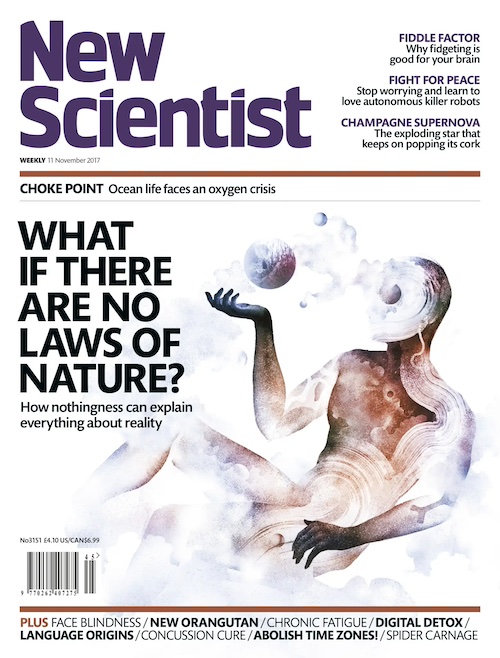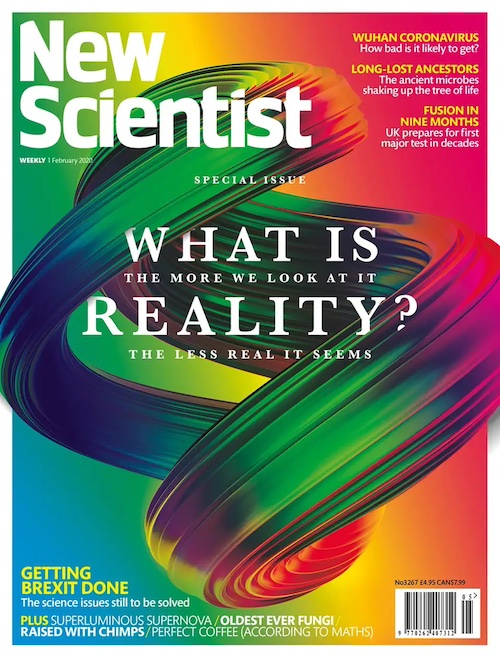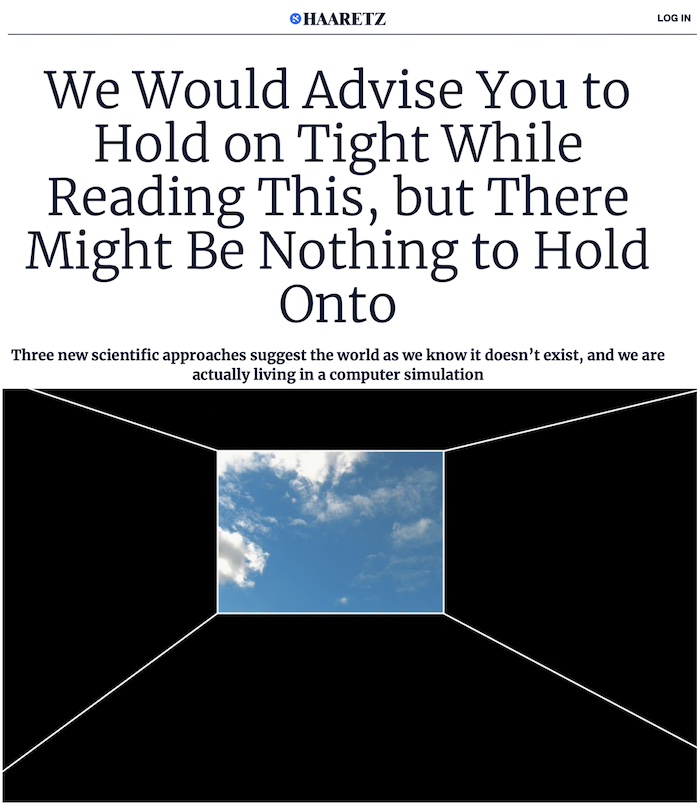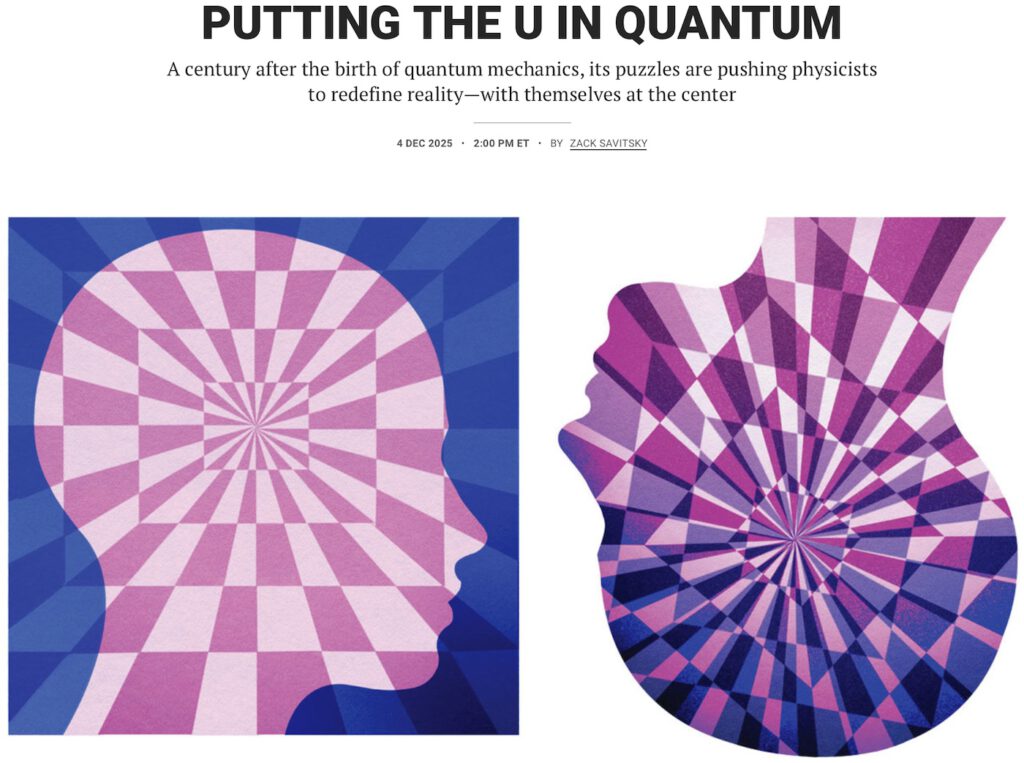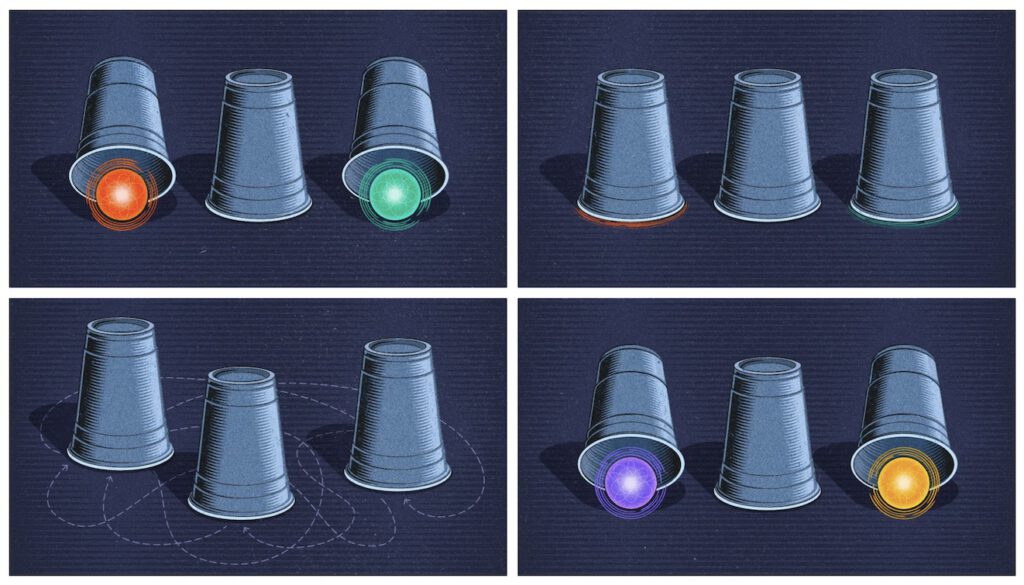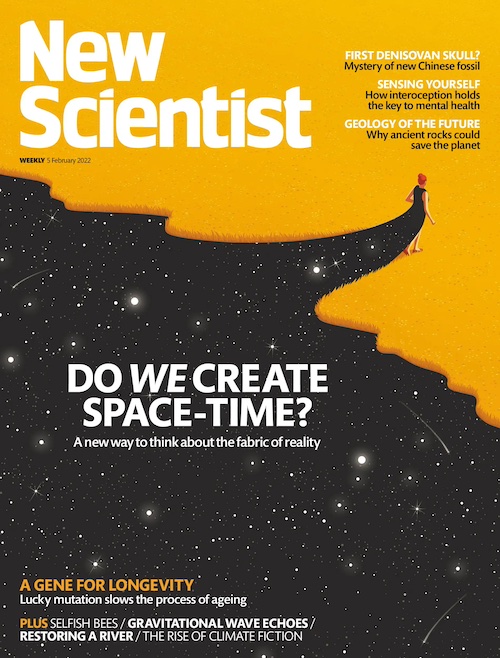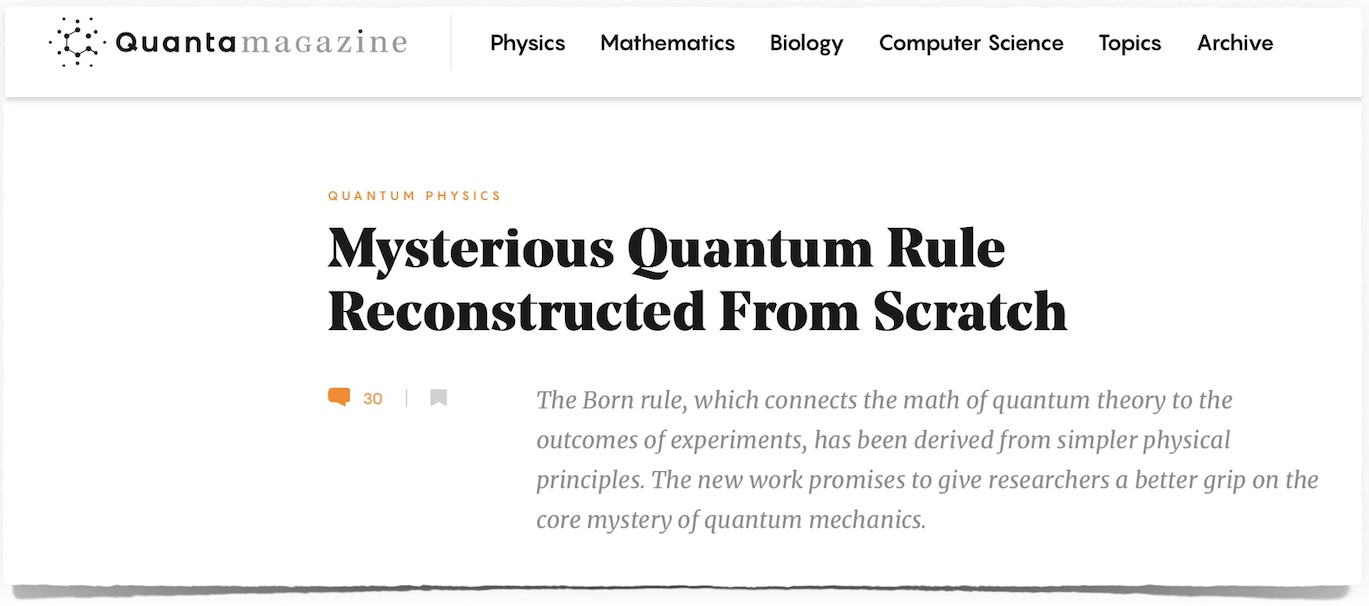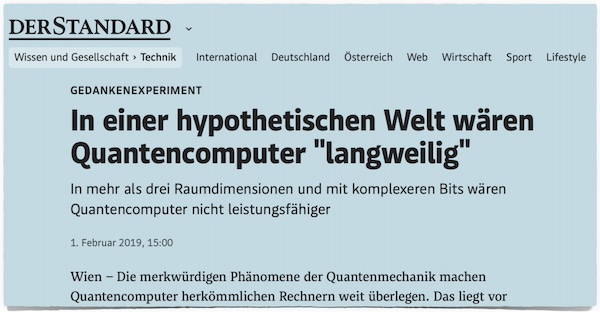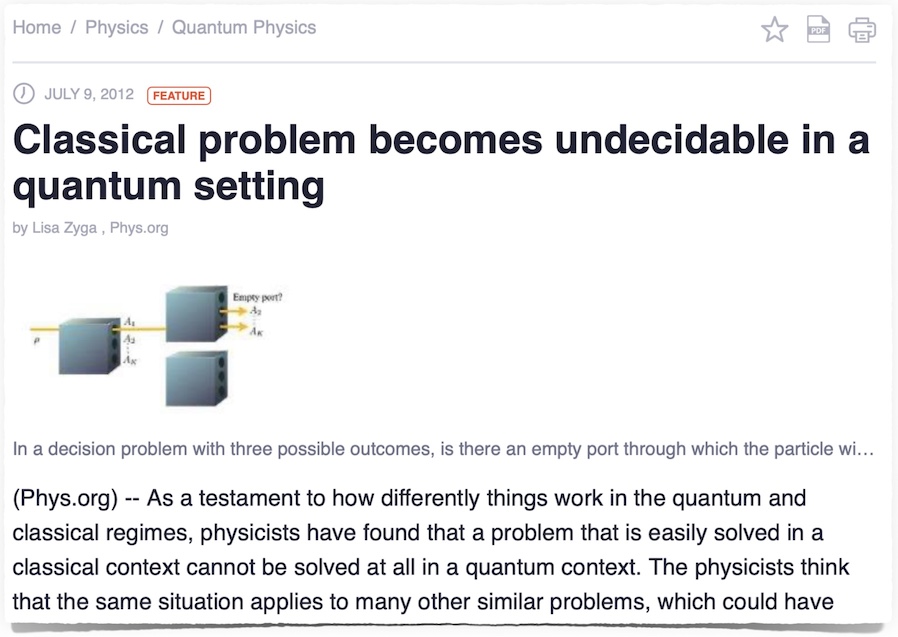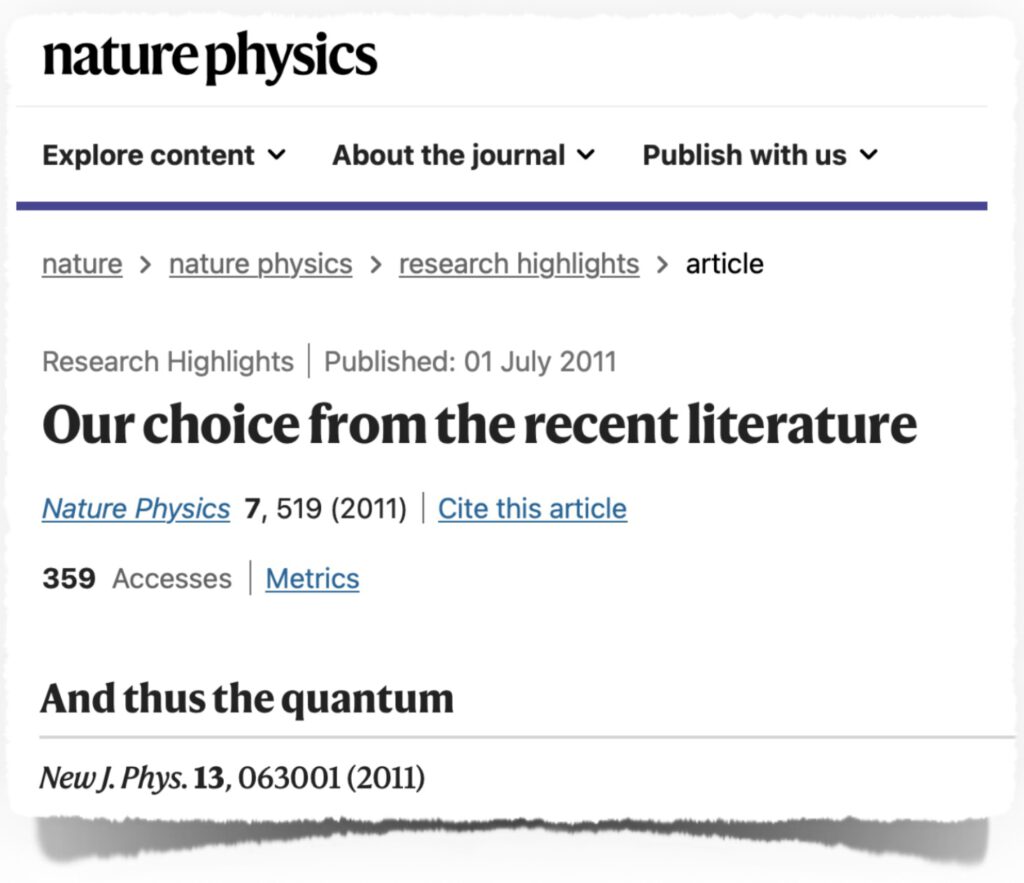Click on the images to access the press articles.
New Scientist, November 2017 and January 2020, and Haaretz, April 2019
Discusses my theory of “Algorithmic Idealism“, and Haaretz describes it alongside with the work of Nick Bostrom and Donald Hoffman.
Science Magazine, December 4, 2025:
Putting the U in Quantum
A wonderful article featuring several friends and colleagues from our community (in particular Chris Fuchs and Carlo Rovelli) who share the vision that quantum theory forces us to rethink reality entirely.
Links to our recent papers on Wigner’s Friend and Algorithmic Idealism. Quotation:
[…] Why care about the subjective nature of reality if we can’t access it, then? Markus Müller, a physicist at the Institute for Quantum Optics and Quantum Information Vienna, draws a comparison to general relativity and its time dilation effects, which must be accounted for in technologies such as GPS. “It’s pretty much irrelevant in everyday life,” Müller says, and yet “ultimately, it turned out to be very important to understand.” If nonabsoluteness is indeed a general property of physical theories, we should center physics around experience, he argues. “We belong to be in the picture—that’s what quantum theory tells us.” […]
Quanta Magazine, April 11, 2025:
‘Paraparticles’ Would Be a Third Kingdom of Quantum Particle
Discusses the work by Wang and Hazzard alongside with our paper on parastatistics:
[…] taken together, the work is reopening the case of a physics mystery that was believed to be solved decades ago. A basic question is being reevaluated: What kinds of particles does our world allow? “Maybe if the particles are close by, I swap them, but if they are far away I do nothing,” Müller said. “And if they’re in a superposition of both, then I do the swapping in one branch, and nothing in the other branch.” Whether observers across branches label the two particles in the same way should make no difference. This stricter definition of indistinguishability is only satisfied by Bosons and Fermions.
New Scientist, February 5, 2022
Do we create space-time? A new perspective on the fabric of reality
Describes work by our colleagues Flaminia Giacomini and Časlav Brukner on quantum reference frames, and then summarizes our paper below, which has inspired recent work by Flavio Mercati and Giovanni Amelino-Camelia and co-authors.
P. A. Höhn and M. P. Müller, An operational approach to spacetime symmetries: Lorentz transformations from quantum communication, New J. Phys. 18, 063026 (2016).
Click here for a short excerpt of the New Scientist article.
Quanta Magazine, February 13, 2019:
Mysterious Quantum Rule Reconstructed From Scratch
Discusses our work on deriving the Born rule:
Ll. Masanes, T. D. Galley, and M. P. Müller, The measurement postulates of quantum mechanics are operationally redundant, Nat. Commun. 10, 1361 (2019).
For an excellent description in German, see Martin Bäker’s blog. See also the headline at Science Alert and three blog posts: Science After Sunclipse, More Quantum, forum.eu.
Der Standard, February 1, 2019:
In a hypothetical world, quantum computers would be “boring”. In more than three spatial dimensions and with more complex bits, quantum computers would not be more powerful. (Click on image for article).
A very imaginative interpretation of our paper on an improved reconstruction of quantum theory and the three-dimensionality of the Bloch ball:
M. Krumm and M. P. Müller, Quantum computation is the unique reversible circuit model for which bits are balls, npj Quantum Inf. 5, 7 (2019).
See also Tiroler Tageszeitung, R&D Magazine, phys.org, Space Daily, newswise, EurekAlert!, and elsewhere.
Phys.org, July 9, 2012
Classical problem becomes undecidable in a quantum setting
Discusses our publication
J. Eisert, M. P. Müller, and C. Gogolin, Quantum measurement occurrence is undecidable, Phys. Rev. Lett. 108, 260501 (2012).
See also Searching for the Impossible, FQXi Article, January 16, 2015.
If you find this interesting, you should also have a look at the masterful work by Toby Cubitt, David Pérez-García and Michael Wolf, in particular this. Journal version of their result (I was not involved, and their work was in general completely independent from ours):
T. S. Cubitt, D. Pérez-García, and M. Wolf, Undecidability of the spectral gap, Nature 528, 207-211 (2015).
See also Nature News of December 9, 2015.
Nature Physics Research Highlights, July 1, 2011
And thus the quantum
Summarizes our publication
Ll. Masanes and M. P. Müller, A derivation of quantum theory from physical requirements, New J. Phys. 13, 063001 (2011)
in which we derive the Hilbert space formalism of quantum theory from five simple principles.
Our work was one of the first complete reconstructions of quantum theory from simple information-theoretic principles.
Videos and Podcasts
YouTube video by Michael DiFranco on Fractional Sums (April 11, 2025)
As a teenager, I’ve found a natural way to extend the definition of sums to non-integer numbers of addends. Michael DiFranco has rediscovered the definition in different terms, and has produced a wonderful video that explains how it can be done.
See here for more information (publications, formula gallery).
Podcast with Karl Friston on my Algorithmic Idealism approach (June 28, 2023)
Why do I propose this approach, how is it done, and what can it predict? I am grateful to Karl Friston and the Philosophy Babble team for the opportunity to discuss this with them.
Podcast with Matt Leifer on interpretations of quantum theory and the nature of reality (July 2024)
Thank you to Ding Jia for having us! Check out his Debates in Science podcast.
Part 1: Matt Leifer
Part 2: Markus Müller
Part 3.1: Our debate. Is it time to move past interpretations of QM?
Part 3.2: Our debate. Are quantum probabilities subjective or objective
Part 3.3: Our debate. Weirdness as a criterion of scientific truth
Further press coverage and blog posts
- Why Space has Exactly Three Dimensions. New Scientist, September 25, 2013. Discusses several approaches towards answering this question, including our work: M. P. Müller and Ll. Masanes, Three-dimensionality of space and the quantum bit: an information-theoretic approach, New J. Phys. 15, 053040 (2013).
- Heroes of Zeroes (Nature Physics). Our publication C. M. Bender, D. C. Brody, and M. P. Müller, Hamiltonian for the Zeros of the Riemann Zeta Function, Phys. Rev. Lett. 118, 130201 (2017) has been unsuitably overhyped by some media (e.g. the Wire), and, as a reaction, received harsh criticism (e.g. by Peter Woit). Let me therefore clarify my position on this:
- No, our work will almost surely not lead to a proof or direct significant progress on the Riemann conjecture. The problem is simply too hard for any simple idea or observation like ours to lead to direct progress.
- Our main observation is fully mathematically rigorous, and arguably interesting. It realizes some aspects of the Berry conjecture: an operator that can naturally be written as XP+PX, with eigenvalues (corresponding to the Riemann zeroes) which are real if and only if the Riemann hypothesis is true. The operator is related to finite differences and fractional sums in an interesting way, and the eigenfunctions are related to the Hurwitz zeta function. During the time of hype and criticism, I have also written up a short note that describes the underlying mathematics rigorously and in a condensed way, but this has not drawn a lot of attention despite the ongoing discussions.
- Some reasonable coverage includes Nature Physics, phys.org, Quanta magazine, and Spektrum der Wissenschaft.
- Quantum Causality: Information Insights. Nature News&Views, October 28, 2012. Article by Terry Rudolph on recent work by the quantum foundations community, including our works on the structure of space and quantum theory:
M. P. Müller and Ll. Masanes, Three-dimensionality of space and the quantum bit: an information-theoretic approach, New J. Phys. 15, 053040 (2013), and G. de la Torre, Ll. Masanes, A. J. Short, and M. P. Müller, Deriving Quantum Theory from Its Local Structure and Reversibility, Phys. Rev. Lett. 109, 090403 (2012). - Comments on Baldijão et al.’s GPT-generalized quantum Darwinism. Jess Riedel’s blog, January 3, 2021. Nice discussion of our paper R. D. Baldijão, M. Krumm, A. J. P. Garner, and M. P. Müller, Quantum Darwinism and the spreading of classical information in non-classical theories, Quantum 6, 636 (2022).
- How Quantum Mechanics Derives from a Revolutionary New Theory of Information. Physics arXiv blog, October 30, 2013. Overhyped title, but otherwise a nice read. Discusses our reconstruction of quantum theory as given here: Ll. Masanes, M. P. Müller, R. Augusiak, and D. Pérez-García, Existence of an information unit as a postulate of quantum theory, Proc. Natl. Acad. Sci. USA 110, 16373 (2013).
- Stationary Algorithmic Probability. AI Alignment Forum, April 29, 2017. Interesting discussion of my paper: M. Müller, Stationary algorithmic probability, Theor. Comput. Sci. 411, 113-130 (2010); arXiv:cs.IT/0608095. See also the very interesting and closely related blog post by Matthew Farrugia-Roberts on Turing trees.
